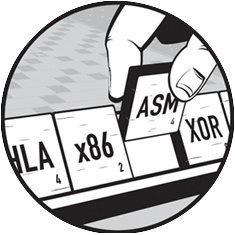| .. | ||
| img | ||
| config.el | ||
| funcs.el | ||
| packages.el | ||
| README.org | ||
asm layer

Description
This layer adds support for Assembly code. The built-in major mode for
editing assembly code in Emacs is asm-mode.
The layer also adds nasm-mode for NASM-specific syntax. Although nasm-mode
is intended for NASM, it actually works well with other variants of Assembly
in general, and provides Imenu integration so you can jump around with SPC s j.
Features:
- Improved syntax highlighting.
- Automatic indentation.
- Auto-completion for symbol in opened buffers.
- Look up documentation for current instruction at cursor.
- Imenu integration.
Install
Layer
To use this configuration layer, add it to your ~/.spacemacs. You will need to
add asm to the existing dotspacemacs-configuration-layers list in this
file.
PDFs
To look up the x86 instructions, two things are required:
- the
pdftotextcommand line tool from Poppler:
sudo apt-get install poppler-utils- Intel® 64 and IA-32 Architectures Software Developer Manuals. Any PDF that contains the full instruction set reference will work, though volume 2 is the best choice for x86-lookup.
Then, set x86-lookup-pdf to the location of your PDF document (Tip: If you use
Helm as your completion of choice, you can use SPC f f to navigate to the
file, and press C-c i to insert the path). For example, something like this:
(setq x86-lookup-pdf "~/64-ia-32-architectures-software-developer-instruction-set-reference-manual-325383.pdf")The first time you launch the command, it can take a while for indexing, this is a one time operation and the result is cached for later use.
Key bindings
| Key Binding | Description |
|---|---|
SPC m h h |
Look up the documentation for instruction at point |
; |
Insert a comment |
Note: Quoted from the docstring of asm-comment, the command bound to ;:
Convert an empty comment to a `larger' kind, or start a new one.
These are the known comment classes:
1 -- comment to the right of the code (at the comment-column)
2 -- comment on its own line, indented like code
3 -- comment on its own line, beginning at the left-most column.
Suggested usage: while writing your code, trigger asm-comment
repeatedly until you are satisfied with the kind of comment.